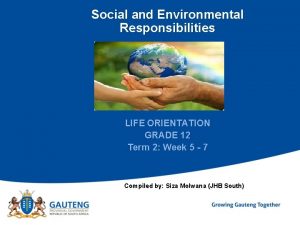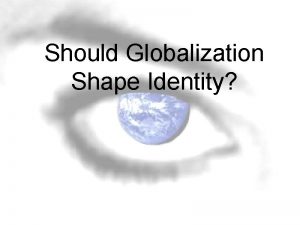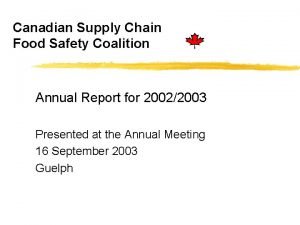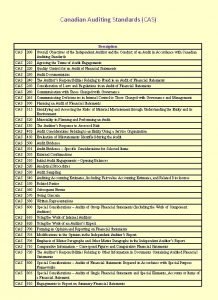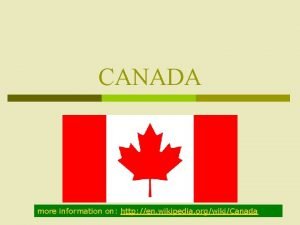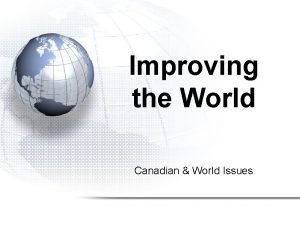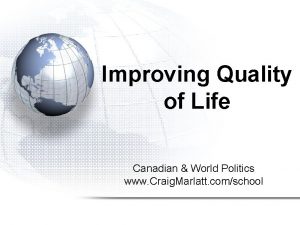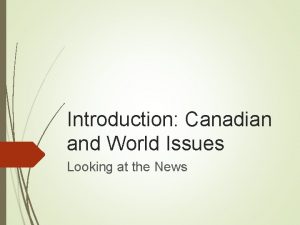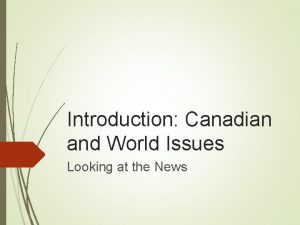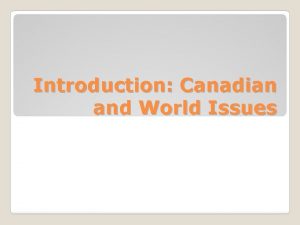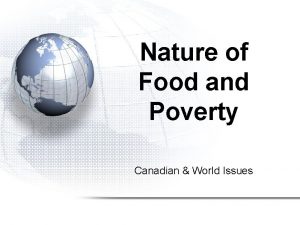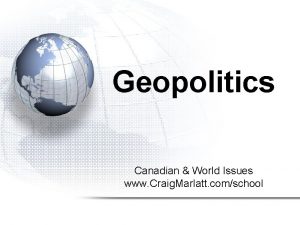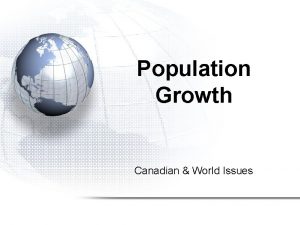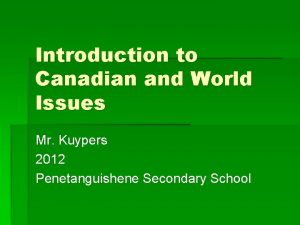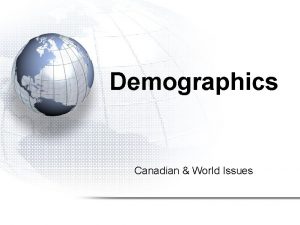Quality of Life Canadian World Issues Quality of




























- Slides: 28

Quality of Life Canadian & World Issues

Quality of Life 1. Measuring Quality of Life 2. Human Rights 3. World Religions

Measuring Quality of Life • The criteria one uses to measure “quality of life” will greatly affect the resulting ranks. • What should be considered to measure “quality of life”? – – – Health Education Demographics Finance ?

Measuring Quality of Life • Human Development Index (HDI) is a comparative measure of life expectancy, literacy, education, and standards of living for countries worldwide – developed in 1990 by Pakistani economist Mahbub ul Haq – adopted by the UNDP in 1993

Measuring Quality of Life • Human Development Index looks at 3 factors: – Life expectancy at birth – Knowledge (adult literacy rate, gross enrolment ratio) – Gross Domestic Product per capita at Purchasing Power Parity • Close to 1 = high quality of life • Close to 0 = low quality of life

Measuring Quality of Life ██ high (0. 800 - 1) ██ medium (0. 500 - 0. 799) ██ low (0. 300 - 0. 499) ██ n/a

Measuring Quality of Life • Human Development Report 2007 1 2 3 4 Iceland Norway Australia Canada 0. 968 0. 962 0. 961 168 169 170 171 Dem Rep of the Congo Ethiopia Chad Central African Rep 0. 390 0. 384 0. 371 0. 368 5 6 7 8 9 10 Ireland Sweden Switzerland Japan Netherlands France 0. 959 0. 956 0. 955 0. 953 0. 952 173 174 175 176 177 Mozambique Mali Niger Guinea-Bissau Burkina Faso Sierra Leone 0. 353 0. 349 0. 342 0. 338 0. 335 0. 311

Measuring Quality of Life • An HDI of 0. 8 or more is considered to represent high development. – all developed countries – some developing countries in Eastern Europe, Latin America, Southeast Asia, and the oil-rich Arabian Peninsula • An HDI below 0. 5 is considered to represent low development – 29 of the 31 countries in that category are located in Africa, with the exceptions of Haiti and Yemen

Measuring Quality of Life • Canada worked its way up to the #1 spot on the HDI rankings on 10 different occasions (including 7 years in a row from 1994 -2000) • Since then, we’ve dropped as low as #6 (and now #4) while Norway and now Iceland claim top honours 2007 – 2006 – 2005 – 2004 – 2003 – 2002 – 2001 – Iceland Norway Norway 2000 – 1999 – 1998 – 1997 – 1996 – 1995 – 1994 – Canada Canada 1993 – 1992 – 1991 – 1990 – 1985 – 1980 – Japan Canada Switzerland

Human Rights • What things are all humans entitled to, regardless of ethnicity, nationality, sex, and related factors? – – – – security liberty political due process equality welfare group

Human Rights • Universal Declaration of Human Rights (UDHR) Eleanor Roosevelt • Agencies John Humphrey – United Nations Human Rights Council (UNHRC) – Canadian Human Rights Commission (CHRC) – Ontario Human Rights Commission (OHRC)

Human Rights – United Nations High Commissioner for Human Rights (UNHCHR) is Canadian Louise Arbour • The idea for a UNHCHR was Humphrey’s • Role is to coordinate human rights activities throughout the UN system and supervise the Human Rights Council – UDHR is not law binding, so… • Canadian Charter of Rights & Freedoms (and its predecessor, the Bill of Rights) • Ontario Human Rights Code


World Religions

World Religions

World Religions • Eastern Religions – Hinduism – Confucianism – Buddhism • Western Religions – – Judaism Catholicism Islam Protestantism

World Religions • Hinduism – oldest of major world religions – believe in a single divinity that is present in everything – through reincarnation, at death a soul passes from one body to another – good actions in this life lead to a better situation in the next incarnation – rules for diet, family, caste (hereditary social class), and politics – doctrine of non-violence, or ahimsa, was the basis for Mahatma Gandhi’s use of civil disobedience – some Hindus opposed Gandhi

World Religions • Confucianism – Confucius (551– 449 BCE) created a system of “right living” known as ren – Confucius taught rulers to act humanely toward their subjects – parents, teachers, and government officials were the guardians of this civic religion (no priests) – all human relationships involved defined roles and mutual obligations – a social hierarchy – egalitarianism – the promotion of equality – co-existed with Buddhism and Taoism well, until Mao Zedong outlawed all religions in 1949

World Religions • Buddhism – Siddhartha Gautama (ca. 563– 483 BCE) preached that enlightenment was to be found in the Middle Way, the path that lies between indulgence and asceticism (rigid self-discipline) – many characteristics of Hinduism were adopted – a “buddha” is someone who has awakened to the true nature of universal cause and effect, and whose awareness transcends birth, suffering, and death – Emperor Ashoka made Buddhism the state religion of India and spread it throughout southeast Asia and the Middle East – diaspora of Tibetans spread it further

World Religions • Judaism – Romans destroyed the Temple of Jerusalem in 70 CE, forcing Jewish people to spread throughout the world (diaspora) – in some “host countries”, they were accepted and given much religious freedom; in others, they were viewed as outsiders and treated with hostility – although both Jews and Arabs are Semitic peoples, “anti-Semitism” has come to mean hatred of the Jewish people – Hitler’s Holocaust (1933 -1945) was the most extreme example of anti-Semitic behaviour

World Religions • Catholicism – led by the pope, who is seen as the successor to Saint Peter as Christ’s representative on Earth – eastern and western churches evolved • western Christians used Catholicism to political advantages (carrying out the Spanish Inquisition, creating denominational schools, and discouraging divorce, abortion) • eastern Christians saw themselves as Orthodox – following the principles of the original religion • excommunication of two leaders in 1054 finished the schism • John Paul II reached out to the east, but no reconciliation

World Religions • Islam – Islam is an Arabic word that means “submission” – a follower of Islam is called a “Muslim, ” which means “one who submits to the will of Allah” – Muhammad (570– 632 CE) recorded the word of Allah, in the Qur’an, the holy book of Islam – there is no separation of church and state in Islamic countries – no discrimination based on race or class – Christians and Muslims began fighting over access to holy sites in Jerusalem – political violence contradicts Islam’s traditional teachings - jihad (holy war) is actually the ongoing inner struggle of conscience to be a better Muslim

World Religions • Protestantism – is the politics of dissent – Martin Luther (1483– 1546) and the Protestant Reformation opposed the power of the Roman Catholic Church – England’s Act of Supremacy made the king or queen of England the head of the new Church of England – John Calvin, John Knox, and others appealed to the middle classes and gave rise to political democracies – Calvinism, Presbyterianism, and political voices of conscience such as Quakers are all forms of Protestantism

World Religions • Religious Conflict Around the World – – – Nigeria Tibet Sri Lanka Philippines Kosovo Northern Ireland

Human Rights • Map of Religious Freedom (2000)

World Religions • Religion can help promote peace and unity among the people of the world. – “Thou shalt love they neighbor as thyself. ” (Judaism and Christianity, Leviticus 19: 18, Matthew 22: 39) – “For hatred does not cease by hatred at any time: hatred ceases by love. This is an old rule. (Buddhism, Dhammapada I 5) – “Peace is the highest value. ” (Taoism, Tao Te Ching, Chap. 31) – “All peoples shall love one another and live together in peace. ” (Iroquois, Book of Life)

World Religions • Religion can help promote peace and unity among the people of the world. – “Who will care and caress this land, this earth? . . . It is truth, justice, and compassion. ” (Maori, traditional Maori song) – “O you who have attained to faith! Be ever steadfast in your devotion to God, bearing witness to the truth in all equality; and never let hatred of anyone lead you into the sin of deviating from justice. Be just: this is the closest to being God-conscious. And remain conscious of God: verily, God is aware of all that you do. ” (Qur’an, 5: 8) – “Ahimsa (non-violence) is the ultimate duty” (Hindu, Mahabharata, Adi Parva, 11: 13)

World Religions • Religion can help promote peace and unity among the people of the world. – Why do religious conflicts occur? – Other than avoiding conflicts, why is it important to understand the religious traditions of others? – How can religion provide a spiritual basis for human rights?
 Canadian shield environmental issues
Canadian shield environmental issues Issues in canadian geography grade 9
Issues in canadian geography grade 9 Flexo print quality issues
Flexo print quality issues Data quality issues
Data quality issues Ieee 1159
Ieee 1159 Grade 10 life orientation
Grade 10 life orientation Pure heart verse
Pure heart verse Blessoff overcoming
Blessoff overcoming Tundra vegetation region canada
Tundra vegetation region canada Canadian registered safety professional designation
Canadian registered safety professional designation Cibin
Cibin Dimension of globalization
Dimension of globalization Interior lowlands facts
Interior lowlands facts Marketing an introduction 6th canadian edition
Marketing an introduction 6th canadian edition Rainforest plant adaptations
Rainforest plant adaptations Canadian engineering accreditation board
Canadian engineering accreditation board Canadian league against epilepsy
Canadian league against epilepsy The canadian encyclopedia
The canadian encyclopedia Canadian domestic airspace
Canadian domestic airspace 8 regions of canada
8 regions of canada Canadian supply chain food safety coalition
Canadian supply chain food safety coalition Canadian centre for victims of torture
Canadian centre for victims of torture Ccs perioperative guidelines
Ccs perioperative guidelines Canadian bioinformatics workshop
Canadian bioinformatics workshop Canadian auditing standard 540
Canadian auditing standard 540 Canadian association of rally obedience
Canadian association of rally obedience Innuitian mountains population
Innuitian mountains population Canadian peak wikipedia
Canadian peak wikipedia Natural resources in the canadian shield
Natural resources in the canadian shield





